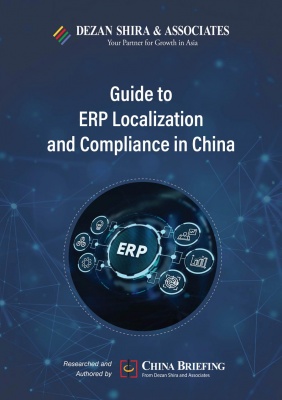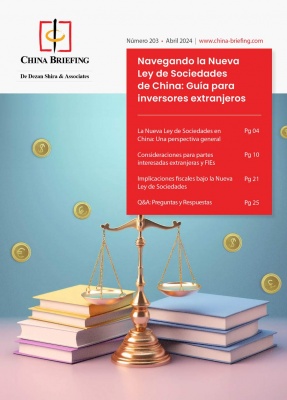SAT Clarifies Beneficial Ownership of Dividends under Tax Treaties
May 22 – China’s State Administration of Taxation (SAT) recently released the “Opinion on Implementing the Dividends Provision under the Tax Arrangement between Mainland China and Hong Kong in Cases involving Beneficial Ownership (Shuizonghan [2013] No. 165, hereinafter referred to as ‘Opinion 165’)” on April 12, in response to inquiries made by the tax bureaus of various provinces and cities throughout China. The inquiries concern cases involving several Hong Kong companies applying for beneficial ownership status under the dividends provision of the Double Taxation Avoidance Agreement (DTA) between Mainland China and Hong Kong. Opinion 165 will apply nationwide to similar provisions in China’s other tax treaties from the date of promulgation.
To enjoy reduced withholding rates on dividends, interest and royalties under China’s tax treaties with other countries, the nonresident recipient must be considered a “beneficial owner” of the income. Opinion 165 clarifies the “unfavorable factors” in determining beneficial ownership as addressed in two previously issued regulations:
- The “Notice Concerning the Meaning and Determination of ‘Beneficial Owner’ in Tax Treaties” (Guoshuihan [2009] No. 601, hereinafter referred to as “Circular 601”), effective October, 2009; and
- The “Circular Concerning the Determination of ‘Beneficial Owner’ in Tax Treaties” (SAT Announcement [2012] No. 30, hereinafter referred to as “Announcement 30”), effective June, 2012.
Opinion 165 clarifies five of the seven “unfavorable factors” listed in Circular 601 as follows:
(1) Circular 601: “The applicant is obligated to pay or distribute all or substantially all (e.g. more than 60 percent) of its income to a resident in a third country (region) within a stipulated time frame (e.g. within 12 months from the date of receipt of the income).”
Clarification (Opinion 165):
When determining whether the applicant is obligated to distribute dividends within a stipulated time-frame, tax authorities should require applicants to provide relevant materials that can reflect its profit distribution situation, as well as the rights and obligations between the applicant and its holding company, including valid articles of association as well as relevant contracts, agreements, or corporate resolutions with its holding company.
This factor is irrelevant if the applicant does not distribute profits to a non-Hong Kong resident.
(2) Circular 601: “Apart from holding the property or right from which the income is derived, the applicant is not or is barely engaged in any other business activities.”
Clarification (Opinion 165):
Business activities include the investment activity of “holding the property or right from which the income is derived.” In order to establish this unfavorable factor, the applicant would have to have no other investment items or other types of business activities.
Investment companies established solely for a single project should not be denied beneficial ownership status merely because of the existence of this unfavorable factor, but should be given comprehensive consideration based on other factors.
(3) Circular 601: “Where the applicant is an entity such as a company, the assets, scale and staff allocation of the applicant are relatively small (or few) and incongruent with its income.”
Clarification (Opinion 165):
The assets of the applicant should be analyzed comprehensively in determining whether they are “incongruent with the income amount,” and “assets” should not be considered as equivalent to registered capital. Applicants with low registered capital amounts should be comprehensively evaluated based on their sources of funding and the degree of investment risk it bears.
When analyzing staff allocation, the emphasis should be on the employees’ work responsibilities and substance, rather than the staff size or whether the applicant bears the labor expenses. Applicants will be required to provide relevant materials.
(4) Circular 601: “The applicant has no or very little right to control or dispose of the income, the property or right from which the income is derived, and assumes little or no risk.”
Clarification (Opinion 165):
This factor should be reviewed from three aspects:
- Whether the articles of association or other laws and regulations grant the applicant with the relevant rights;
- Whether the applicant has exercised any such rights, such as using the distributed dividends for project investment, share allotment, capital increase or transfer, mergers and acquisition, and venture investment;
- Whether the disposals that occurred were based on the applicant’s autonomous decisions (e.g. the applicant’s board of shareholders or board of directors).
The tax authorities should not preclude that the applicant possesses the right of control or disposal merely because the applicant’s equity is controlled by another company.
(5) Circular 601: “The country (region) that is the other party to the treaty exempts or does not impose tax on the relevant income, or taxes such income but at a very low effective tax rate.”
Clarification (Opinion 165):
Since Hong Kong adopts the territorial source principle of taxation, whereby only profits sourced in Hong Kong are taxed, this fact should not be considered a key adverse factor when determining beneficial ownership status.
Announcement 30
Announcement 30, released in late June 2012, builds on Circular 601 to make it simpler to obtain “beneficial owner” status. According to Announcement 30, an applicant that is a listed company in the other contracting state, or is 100 percent directly or indirectly owned by a listed company in the other contracting state (except where the shares of the applicant are indirectly held by the listed company through a resident company of a third state which is neither a resident of China nor the other contracting state), is automatically considered beneficial owner of dividend income as long as the dividends are derived from the shares owned by the listed company.
Clarification (Opinion 165):
The above stipulation should not be interpreted as denial of beneficial ownership status in the following circumstances:
- The applicant is 100 percent directly or indirectly owned by a non-listed Hong Kong resident enterprise; or
- An intermediate holding company registered overseas exists between the applicant and the ultimate Hong Kong holding company.
Furthermore, Opinion 165 stipulates that different local tax bureaus should achieve consistent results when dealing with the same applicant with respect to its investment activities that fall under the same category.
If an applicant undergoes substantial changes in its business, tax bureaus are required to accept its application to enjoy beneficial treatment, verify the changes, and determine its beneficial ownership status accordingly.
Dezan Shira & Associates is a specialist foreign direct investment practice, providing corporate establishment, business advisory, tax advisory and compliance, accounting, payroll, due diligence and financial review services to multinationals investing in emerging Asia. Since its establishment in 1992, the firm has grown into one of Asia’s most versatile full-service consultancies with operational offices across China, Hong Kong, India, Singapore and Vietnam as well as liaison offices in Italy and the United States.
For further details or to contact the firm, please email china@dezshira.com, visit www.dezshira.com, or download the company brochure.
You can stay up to date with the latest business and investment trends across Asia by subscribing to Asia Briefing’s complimentary update service featuring news, commentary, guides, and multimedia resources.
Related Reading
 The China Tax Guide: Tax, Accounting and Audit (Sixth Edition)
The China Tax Guide: Tax, Accounting and Audit (Sixth Edition)
This edition of the China Tax Guide, updated for 2013, offers a comprehensive overview of the major taxes foreign investors are likely to encounter when establishing or operating a business in China, as well as other tax-relevant obligations. This concise, detailed, yet pragmatic guide is ideal for CFOs, compliance officers and heads of accounting who need to be able to navigate the complex tax and accounting landscape in China in order to effectively manage and strategically plan their China operations.
 Double Taxation Avoidance Agreements
Double Taxation Avoidance Agreements
In this issue, we look at the evolution of the legal framework of double taxation agreements in China, including the foundations of anti-avoidance, obligations in reporting offshore transactions, how to qualify as a beneficial owner and how to claim treaty benefits. We also outline the interpretations given in Circular 75 of the China-Singapore DTA, which was the first time that the Chinese tax authorities really opened up about DTA interpretations.
 Hong Kong and Singapore Holding Companies
Hong Kong and Singapore Holding Companies
In this issue of China Briefing Magazine, we take a closer look at the benefits of both Hong Kong and Singapore holding companies, how to establish and maintain a company in each of these jurisdictions, and the relevant double tax agreements.
 M&A Regulations in China
M&A Regulations in China
In this issue of China Briefing Magazine, we focus on the regulatory issues affecting cross-border M&As, and the key tax points foreign investors should be aware of when conducting M&As involving domestic Chinese companies. We also address the key aspects of transfer pricing, corporate restructuring exemption, and valuation as they relate to M&As.
China Clarifies the Determination of Beneficial Owners under Double Taxation Agreements
- Previous Article China Allows Private Equity Investment in Insurance Companies
- Next Article People’s Bank of China to Facilitate RMB Exchange in London


























